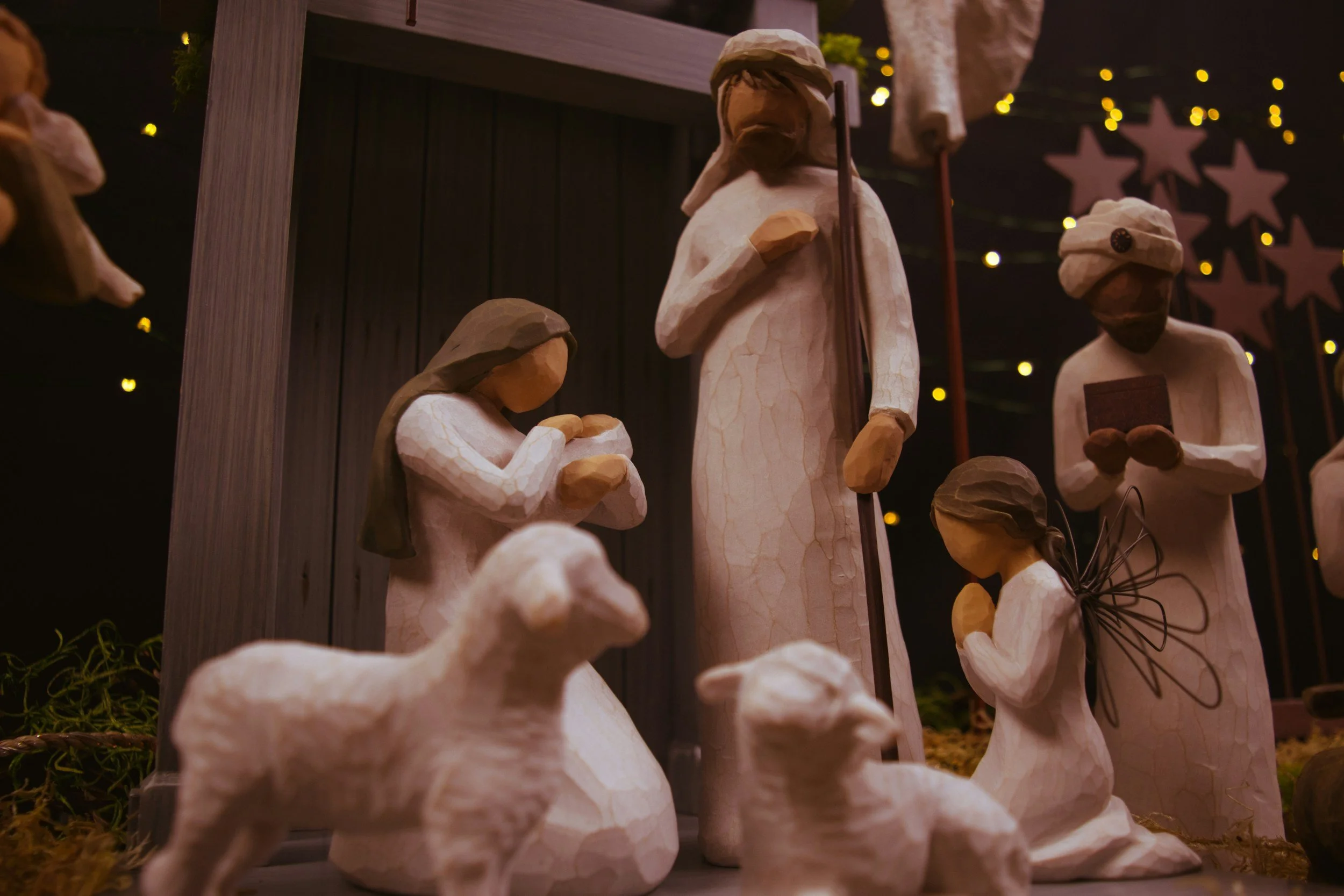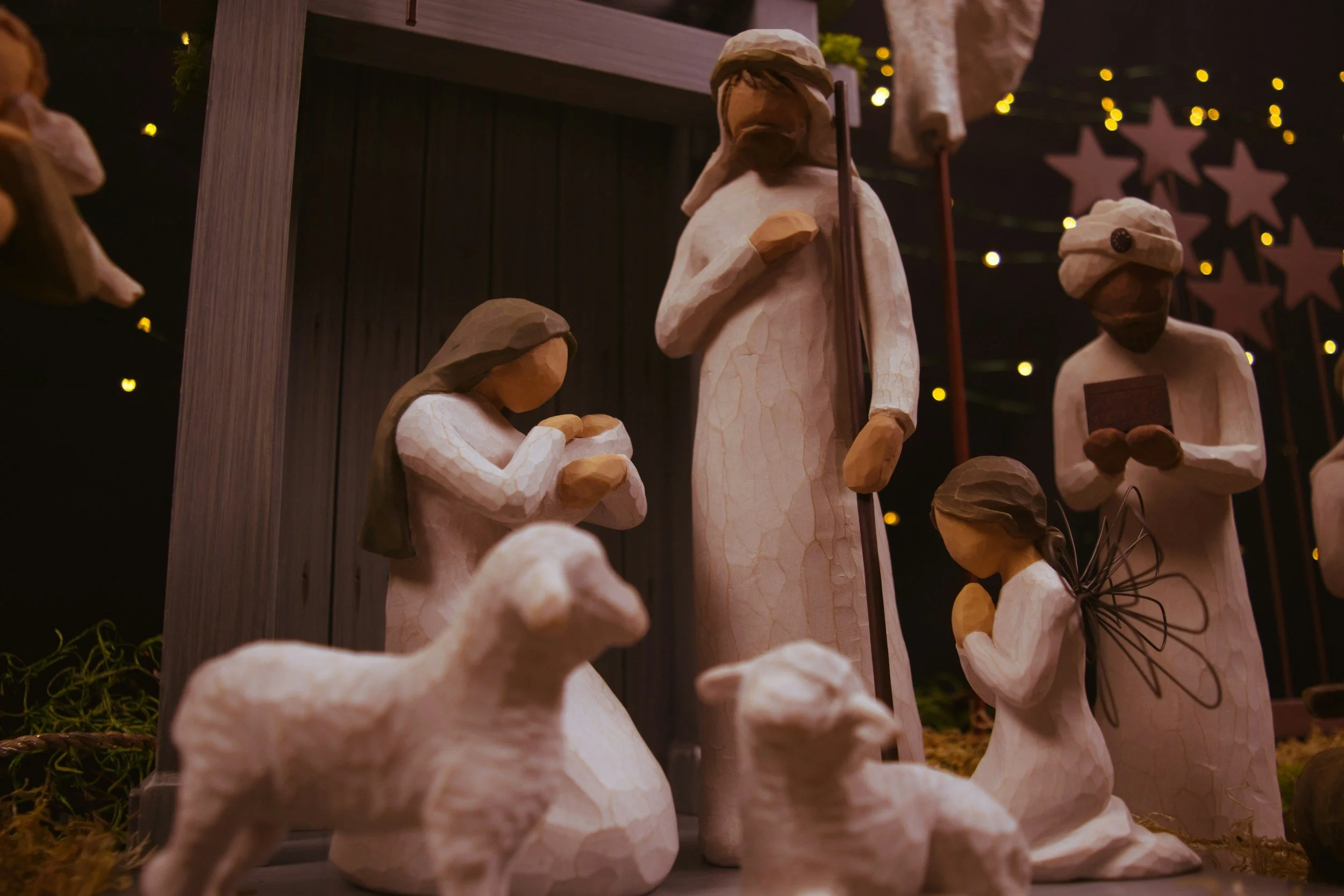WORDS
•
WORDS •
I am passionate about writing and often find that speaking is difficult when trying to get my point across. With writing, it’s easier for me to convey what I feel, but there are still challenges as I’m not perfect. I want to write about the Word and what God calls us to do and be in an uplifting and meaningful way. However, as I do not claim an elite theologian title, I am positive that I am inaccurate or confused about things sometimes. If you ever see anything I write and want to correct me, please fill out the form below so I can convey Truth to all who see it.
Joy to the World
We all celebrate Christmas, but do we celebrate it right? I spend so much time worrying about what to get others, I forget to praise the Lord for the gift He gave us two thousand years ago.
Happy and sincerely Merry Christmas to all across the globe. I am looking forward to spending time with my family and watching people open the gifts I got for them. Though I know that while those things are wonderful miracles in and of themselves, there is abundantly more to this season. I’m guilty of mismanaging my time and gratitude in years past. That being said, now that the gifts are purchased and the craziness is mostly behind me, my goal is to be intentional about staying deep in prayer and meditating on the true reason for this holiday. How lucky are we to live at a time when, because of a baby in a manger, we have a best friend who is all-powerful and all-knowing. I know this time of year is tough for many people. Whether it be unmet expectations, grieving loved ones, or just feeling alone, I pray and hope that we can all find the peace and joy that the Lord brought to us two thousand years ago.
Let’s talk about that night in Bethlehem. Mary and Joseph had to travel there for the Census ordered by Caesar Augustus. We can probably think of it as a holiday like modern Christmas, in the sense that everybody was back in their hometowns and seeing people they may not have seen in a while. So it is logical that there wasn’t room for them to stay; the town was probably busy. They found a barn and Mary gave birth in it, praise God. We probably all know at least the main takeaways of how Mary found out she was going to become pregnant. In Luke 1:26-38, the story goes that Mary and Joseph were about to be married when the Angel Gabriel was sent to inform her that she had found favor with God and that the Savior of the world would come to us through her. She obviously was confused; she didn’t understand how she could be pregnant because she was a virgin. Clearly, with God, anything is possible, and she trusted in the Lord and surrendered herself to His will.
I truly can’t imagine what that birth was like. Or what being the mother of Jesus was like. I’m sure she had the motherly instinct to protect her children from all the evil in the world. But her child was meant to bear all the evil of the world and wear it on the cross for all of us, including her. I feel so much shame for how many of my sins are the reason Jesus was crucified. I can only bet that Mary felt that way, too. But Jesus is so good, and He loves us so much more than we can ever even grasp. Jesus existed before He was put in Mary’s womb. In the beginning of everything, He was there, and He became flesh for the purpose of sacrificing Himself for us. He was, is, and is to come. Death could not defeat Him, and through His sacrifice, we are saved. I always see the anti-Christians proposing that we are all in a cult. My question is, what cult has a leader who would willingly die because of the love he has for the people who follow him?
Because Jesus was born, He could die with our sins, to then be brought back to life and reign over us. This year, let’s focus on the gift from our Savior, which is His existence. He is God with us, His name is the name above all names, and He is the Prince of peace. This should be a joyful time, and we complicate it year after year. Together, let’s focus on Jesus: what He did for us, and how we can be more like Him. Can we sacrifice more money to buy gifts for others in His name? Can we sacrifice more time to reach out to relatives who are hard to talk to? Can we sacrifice comfort to make someone else happy? If we focused on His sacrifice and mimicked Him every day of our lives, I bet we’d be all the better for it. We’d have more fulfillment, peace, and joy. I pray that everyone who reads this will have a Christmas of peace, sacrifice, and joy.
Fruit
Can we compare the fruit of the Spirit to a well-tuned guitar?
I had a vision last night. I was trying to imagine the different ways the fruits of the Spirit show up in my character. We learn from Paul’s letter to the churches in Galatia that the fruit of the Spirit is love, joy, peace, patience, kindness, goodness, gentleness, faithfulness, and self-control (Galatians 5:22-23). While I was thinking about different times I’ve been loving or joyful, the image of a guitar came to mind. Each fruit represents a different string, and the more time you spend with the Lord, the more He tunes them so they all blend in a beautiful harmony. Sometimes we are out of tune, and a good reason for that might be because we are out of our Word or out of prayer.
Then the vision went even further. Situationally, we might need our fruit to show up in different ways. We might need to play a different note on our guitar and switch our finger placement on each string. I thought about a scenario where I was trying to be there for a friend struggling with sin. My love isn’t going to sound like sin is okay and life is short; it’s going to sound like I love them enough to make sure they know that the Lord wants better for them. But where my love would sound similar to ‘it’s okay and we can move on’ could be if my friend was stuck in shame for their past. Like any good guitarist, we need knowledge of the chords we’re meant to be playing at any given time. So how do we know what chords to play? The answer might be that we’d rely on wisdom.
Interestingly, wisdom is not a fruit of the Spirit that Paul describes. King Solomon tells us that wisdom is the fear of the Lord (Proverbs 9:10). Reverence for the Lord is the bedrock for the spiritual insight necessary to respond fruitfully in different scenarios. If we didn’t fear God, we wouldn’t want to do right by Him and respond to others in the way that He would desire us to in the first place. What I understand is that the Lord is the songwriter; the more time we spend singing His songs, studying them, and meditating on them, the better we will be at playing the proper chords on a well-tuned guitar. By that I mean that the time we spend in worship, in our Bibles, and in prayer, the more love, joy, peace, patience, kindness, goodness, gentleness, faithfulness, and self-control we will have, and the more valuable these things will be to other people through us.
Sanctification
Sanctification is the production of fruit, the cleansing of sin, and the creation of a new, holy being. It is a blessing.
Purification and sanctification have been on my mind lately, and I know exactly why. I had this urge to purge old photos and videos. For one, I never look at them, and, for two, if anyone else were to see them, they would be very concerned that I consider myself a godly woman. I view this deletion of memories as part of the never-ending sanctification process that the Lord has been leading me through. Although I suppose it is a good example of the big picture (no pun intended). If each photo represented a sin and each video represented a habit, God will take them, see that they don’t glorify Him, and delete them. He wants us to starve ourselves of the things we take pleasure in that absolutely do not serve Him well. “Then Jesus said to his disciples, ‘Whoever wants to be my disciple must deny themselves and take up their cross and follow me.’” – Matthew 16:24. By the way - He’s not doing this for the sole purpose of depriving us of any fun. He does this because time and time again, we prove that the things we do that don’t serve Him do not serve us at all either.
While going through all the memories that at the time, I thought would be held near and dear to my heart, I became very thankful that God has changed my heart completely. While the faces in the pictures often held smiles, I can remember how empty and worthless my life felt when they were taken. It’s hard to find words that explain the thoughts and feelings I’ve been having after re-experiencing things in hindsight. Being stronger in the Word has helped me see the path of destruction I was going down. There are so many feelings of disappointment for the girl who was ignorant of sin and living for the world. “To open their eyes, so that they may turn from darkness to light and from the power of Satan to God, that they may receive forgiveness of sins and a place among those who are sanctified by faith in me.” – Acts 26:18.
Becoming pure is a constant choice, and there seem to be temptations at every corner. I’ve learned that convictions are a blessing because it’s God’s way of telling us that we can be doing better. If conviction were the fire, our actions and changing our habits are the hands that are molding us into what God is calling us to. “But now, O Lord, you are our Father; we are the clay, and you are our potter; we are all the work of your hand.” – Isaiah 64:8. Striving for perfection should be the goal, though unattainable, with the power of the Holy Spirit, we can stand confidently in the men and women that God is shaping us to be.
For some people, sanctification is a lengthy process. That is how it’s been for me. I could confidently say that I’ve been on a purification journey for years, and the closer I get to the Lord, the more I’m in the Word, the more intense it is. The more I know about Jesus, the more I want to be like Him. For others, though, they are sanctified in one fell swoop. They accept Christ and they become abstinent, freed from drugs and alcohol, mental health, cussing, secular music, all of it- done with at once. For me, it started with removing drugs and alcohol from my life, then weirdly enough, my mental health got better (who could have guessed), and so on. There is no one-size-fits-all for sanctification. It simply is a gift, sometimes uncomfortable, but necessary, to be cleansed by the blood and made new in Him. “I have been crucified with Christ. It is no longer I who live, but Christ who lives in me. And the life I now live in the flesh I live by faith in the Son of God, who loved me and gave himself for me.” – Galatians 2:20.
I can see God working in my past. It's so clear to me now that I'm in the present. I just know that I wouldn't have made it to today on my own. It had to have been Him. That makes me feel unbelievably grateful, and it's also reassuring because I know if He was working then, He is still working now. I have and still do struggle with sin, but God takes everything that was meant for evil and uses it for good. I think about how often sin and darkness have brought me closer to the Lord and led me more directly on His path for me. Without the sanctification and purification the Lord has given me, I would still be a dead woman walking.
Truth
We must base our morality on some type of scale for good vs. bad.
Many people argue about what is true and what is not. What is right and what is wrong? C.S. Lewis begins his book “Mere Christianity” explaining the dichotomy between human nature and human desire. Spiritually speaking, this is the battle we face internally to act with our flesh or with the Holy Spirit. This concept involves responses to situations that are ‘right’ or ‘good,’ but also means that we need agreement on a common truth for what is right and what is good. Thankfully, we, as Christians, have the Bible to stand on and base moral truth upon. However, nonbelievers and even many lukewarm Christians will argue that morality is based on feelings.
This thought came up for me as I was interviewing for a job at a church that made sure to note in the short thirty-minute discussion that they affirm all sexualities and genders. (Affirm: Verb “state as a fact; assert strongly and publicly.”) I was taken aback. No sin should be affirmed by the church. “Take no part in the unfruitful works of darkness, but instead expose them.” – Ephesians 5:11. But going back to what was referred to earlier, this church is not operating under true morality. When the church is having difficulties with moral claims, we had better be prepared with the knowledge that everyone else will, too.
An argument I hear for this is “well, Jesus ate with sinners and tax collectors…” True! He did spend time and energy on sinners, because “it is not the healthy who need a doctor, but the sick” – Matthew 9:12. By the way, I’m not saying that this church is wrong because they welcome sinners. We all sin, and the church is necessary for everybody. This church is wrong because they are betraying the truth that God made man and woman, and nothing else. They are wrong because they are trying to appeal to the world by saying same sex marriage is holy instead of obeying God, who said marriage is a covenant between a man and a woman. “You adulterous people! Do you not know that friendship with the world is enmity with God? Therefore, whoever wishes to be a friend of the world makes himself an enemy of God.” – James 4:4. How easy it could be to simply preach the truth- to simply be about connecting people with God.
The point of this post is to stay on guard and protect your mind from the world. Even the church can sometimes lead us astray, so stay vigilant in the Word. Be aware of what is right and wrong based on what the Creator of life, truth, grace, and peace told us. “Stand therefore, having fastened on the belt of truth, and having put on the breastplate of righteousness,” – Ephesians 6:14. If you find yourself agreeing or disagreeing with things, take note to see how that would stand against the Word of God. When you have a moral choice to make, ensure that your morality is based on what is pleasing to the Lord and not pleasing to the world.
Pride
The antidote for pride is humility. Let us seek humility in every chance we can get.
I’m going to be completely candid, I’ve been struggling with pride recently. I truly hate to admit it, and I lay it at the feet of Jesus. It’s scary because I catch myself in these thoughts and actions, and it feels like I have no control over them. I have felt blameless, which I know is not rooted in truth, and I’ve felt superior - also not rooted in truth. I have overcompensated on the knowledge that I am a daughter of the Most High God, took my princess crown, and ran with it. Instead of theology, I’ve been more focused on me-ology, and I need to constantly remind myself that there would be no me without Him.
The sanctification journey God has taken me on has transformed my life in profound ways. I now see other people falling into sins that I used to struggle with, which makes me feel like I’m doing it all right. I should feel more grateful that the Lord has brought me this far and make myself compassionate and helpful to a brother or sister experiencing things I once went through. “Live in harmony with one another. Do not be haughty, but associate with the lowly. Never be wise in your own sight.” – Romans 12:16. I ask that God make our hearts so grateful and so compassionate that there is no room for anything else.
C.S. Lewis described pride as the great sin. Pride is the reason sin exists if you think about it. The devil wanted to be God so badly that he was thrown out of Heaven. From there, he tempted Eve and Adam in the garden - thus creating the fall of man. “Your heart was proud because of your beauty; you corrupted your wisdom for the sake of your splendor. I cast you to the ground; I exposed you before kings, to feast their eyes on you.” – Ezekiel 28:17. Pridefulness is not from God; the devil coined it, and we want nothing to do with that gross little liar. “When pride comes, then comes disgrace, but with the humble is wisdom.” – Proverbs 11:2. It truly is disgraceful to be prideful, and I pray for all of us to have humble hearts.
The instructions for how to move forward and away from pride are naturally found in the living Word. “Do nothing from selfish ambition or conceit, but in humility count others more significant than yourselves.” – Philippians 2:3. Rank everybody else’s needs above our own. View the lives of others as more valuable than our own. Let’s let the Lord search the intentions of our hearts and convict us of the things we do from a place of selfishness. “‘Let the one who boasts, boast in the Lord.’ For it is not the one who commends himself who is approved, but the one whom the Lord commends.” – 2 Corinthians 10:17-18. If we must boast, let us boast of how amazing our God is.
The truth is, this sin is very embarrassing to admit to. It comes from an extremely delusional place because, by most standards, I do not regard myself as doing all that well in my life. I am incredibly thankful that the best thing I have is my faith and that sin is detrimental, but the Lord is faithful and just: “If we confess our sins, he is faithful and just to forgive us our sins and to cleanse us from all unrighteousness.” – 1 John 1:9. By God’s faithfulness and justice, He cleanses us from sin and forgives us.
Forgiveness
Why is forgiveness important?
I’ve seen this topic all over my social media pages following the tear-jerking and beautiful sentiments of Erika Kirk. If you didn't know, the Charlie Kirk Memorial Service took place on Sunday, September 21st, with many prominent figures who gave what can only be described as sermons - praise Jesus! There were worship leaders, pastors, baptism, and prayer. I can only imagine the energy in the stadium as tens of thousands of believers piled in and called on the Holy Spirit. I wish I could have been there myself, but alas, we live in the digital age where it still felt like I was. Anyway, I personally believe that the most remarkable feature of the service was Erika Kirk’s statement of forgiveness for the person who assassinated her husband, the father of her kids, and the mentor to all who assembled in the stadium or joined in online. The impression that the Kirk family has left on the world will hopefully last for generations to come. Through their platform, they have shown us directly what it looks like to follow Christ, even on the darkest days of our lives.
“Be kind to one another, tenderhearted, forgiving one another, as God in Christ forgave you.” – Ephesians 4:32. To be a part of the body of Christ means inherently to be forgiven and redeemed. If we choose to live in bitter hate and unforgiveness, does this conclude that we ourselves are better or wiser than Jesus Christ? On the cross, Jesus took our punishment; we deserve the cross, we deserve hell, but instead we get grace. Through the grace we were gifted so freely and so lovingly, it’s our job and a part of our design to give other people grace, too. Let God stand in judgment; that is not our job. If your grace could show even one person a characteristic of our King, isn’t it worth it?
“And whenever you stand praying, forgive, if you have anything against anyone, so that your Father also who is in heaven may forgive you your trespasses.” – Mark 11:25. According to this passage, our forgiveness from the Father is dependent on the unforgiveness in our own hearts. “Judge not, and you will not be judged; condemn not, and you will not be condemned; forgive, and you will be forgiven” – Luke 6:37. When we forgive, it’s not just for the other person’s feelings. It’s for our own salvation, too. Forgiveness, like every other command we receive from God, comes with a freedom that will ultimately make our lives better.
I really pray for anybody living with the weight and burden of unforgiveness. There are many crosses we have to bear, but that is not one of them. It’s not to say that we have to forget the trespasses against us. Forgiveness without forgetfulness makes us wiser people. “Above all else, guard your heart, for everything you do flows from it.” – Proverbs 4:23. If someone mistreats us, forgiveness doesn’t have to come with enduring the treatment. Remembering what someone did to us is different from not forgiving them for it. Forgiveness can mean that you have distance from people who wronged you, but still pray for their salvation and for good in their lives.
Self Love vs. Selfish
Self-love is Biblical when done in respect to appreciating and respecting the bodies that we were given by God.
Something interesting that I’ve been pondering is the difference between loving ourselves out of respect for who God made us to be versus idolizing who we are. In a world filled with advice like ‘follow your heart’ or ‘you only live once, ’ of course, we are going to see advice on loving ourselves. Much of which likely has nothing to do with God or what He intended for us. The linked article offers tips such as ‘don’t judge yourself’ and ‘know when to say no.’ These can be good at times, but let's consider the distinctions between judging ourselves and feeling convicted. Convictions will make us better people and bring us closer to Jesus. Knowing when to say no: of course, we don’t need to say yes to every single invitation; however, we are called to go the extra mile (literally- Matthew 5:41) for people.
We know for certain that God is love. If God dwells in us, we should feel love for ourselves by that fact alone. “Whoever does not love does not know God, because God is love.” – 1 John 4:8. Many Christians, myself included, can tell you that they love much more deeply and certainly differently after committing their lives to Christ. By design, this extends to how we love ourselves, as well. Before knowing Jesus, I had often heard that you can’t love someone properly if you don’t love yourself first. What I know now is that you cannot love someone properly unless you love Jesus first. “We demolish arguments and every pretension that sets itself up against the knowledge of God, and we take captive every thought to make it obedient to Christ.” – 2 Corinthians 10:12. Allowing Jesus into your heart and making your thoughts obedient to Him will allow you to appreciate yourself and other people for their souls and nothing else.
The other evidence here for how we should love ourselves is “Love the Lord your God with all your heart and with all your soul and with all your mind and with all your strength.’ The second is this: ‘Love your neighbor as yourself.’ There is no commandment greater than these.” – Mark 12:30-31. This gives us a baseline for what was previously stated. If we love God, we will naturally love ourselves. Both of which will allow us to love our neighbor. The selfish self-love we see today is keeping us from the relationship design God intended for us. Instead of the selfless love He showed us, or the merciful, forgiving, convicting, mentoring, love that wants the best for others, we see so much jealousy and unforgiveness in relationships. I see instances of projecting insecurities on other people, which ends in hatred. I’m not saying that when you become a Christian, all that goes away, but rooting your identity and who you are in Jesus Christ will allow you to feel much less insecure about the fleeting matters of the world.
I know I use this verse a lot in these posts, but I recognize it as relevant to the topic. “Love is patient, love is kind. It does not envy, it does not boast, it is not proud. It does not dishonor others, it is not self-seeking, it is not easily angered, it keeps no record of wrongs. Love does not delight in evil but rejoices with the truth. It always protects, always trusts, always hopes, always perseveres.” – 1 Corinthians 13:4-7. I urge you to be patient and kind with yourself. Make sure your self-care isn’t selfish or a result of jealousy or pride. It shouldn’t be dishonoring to others; for example, if you’re reading a book after a long day and someone in your house needs help with a task, come back to your alone time after you help them. It also should not be self-seeking; if you go to the gym to honor the temple the Lord blessed you with, that is one thing. If you’re going for the intent of feeling hotter or more attractive, that’s another.
God blessed us with wonderful, able bodies and minds. We are prepared to face the hills and valleys He has called before us. He thought of everything when He made us how He did. He gave us the ability to love, to feel, to excel, to sympathize, to hypothesize, and everything in between. We should truly love who we are because we were created by Him in His image. This is easier said than done, especially as a woman, but a spirit check now and then could be the difference between how you love someone that day.
God bless you. xo
Biblical Marriage
Why we should follow what the Bible says about marriage.
It has recently come to my attention that many people in society find the Biblical standard for marriage to be weird. They find it ‘off-putting’ and ‘oppressive’, and I would like to talk about it. As a woman, feminism is a great thing. It gave us the right to vote, the right to have our voices heard as equal members of society, and most importantly, the right to choose what kind of woman we want to be. Without the waves of feminism and the work of women's activism taking place long ago, who knows if I’d even be able to write this for you today? I have seen many issues and immorality that come with recent hyperfeminism these days. It’s as if we took it a step further and instead of wanting equal rights, we want men to suffer. We no longer look for good husbands; we do not desire to make warm homes or strong families anymore. We chase money, access, careers, and the eternally invaluable worldly possessions.
So, what does the Bible say about marriage? Ephesians 5:22-23 says, “Wives, submit to your own husbands, as to the Lord. For the husband is the head of the wife even as Christ is the head of the church, his body, and is himself its Savior.” Wives are called to be led by their husbands. Wives are called to be in submission to their husbands just as we are in submission to the Lord. This is why it’s important to find a husband who bows to God and only God. This is also why it’s important to find love as it’s described in the Bible. “Love is patient and kind; love does not envy or boast; it is not arrogant or rude. It does not insist on its own way; it is not irritable or resentful; it does not rejoice at wrongdoing, but rejoices with the truth. Love bears all things, believes all things, hopes all things, endures all things.” – 1 Corinthians 13:4-7
If you don’t look for a man of God and if your relationship is impatient, unkind, jealous, rude, resentful, and leads you down wrong paths, you might be in submission to your husband, which is good, but he isn’t doing his part for you both. “Husbands, love your wives, as Christ loved the church and gave himself up for her, that he might sanctify her, having cleansed her by the washing of water with the word” – Ephesians 5:25-26. Now THAT is a man we can submit to. Someone who loves us like Jesus loves us. Someone who would lay down his life for us, who desires to sanctify and cleanse us.
The devil tries his best to destroy marriage because of its blatant display of the covenant Jesus has with His church. With a husband like Christ and a wife like the church, God is at the center, and that marriage will seldom fail. That marriage will produce fruit, spread light, and plant seeds in every facet it reaches. What we are doing wrong these days is not realizing that if we aren’t in submission to Jesus or to a husband who leads us to Jesus, we are in submission to something else. If the thing that’s ‘weird’ about Biblical marriage is submission, let's look and see what we could be in submission to otherwise:
Money
Career
Substances
Political party
Social Media
Social Norms
The point is, thinking submission is weird or misogynistic does not mean you are not currently in submission to something. Let’s make sure we are in submission to the things that actually matter in this life. There is nothing under the sun that is more important than Christ and our relationship with Him. The entire book of Ecclesiastes verifies this to be true. I pray for each woman reading this who is operating under the guise of ‘woman empowerment’ as I once was. There is nothing better that you could do for yourself than to fully commit and fully submit to the One who loves you more than anything you could fathom or experience elsewhere. The world hates you, but Jesus, JESUS loves you.
One Nation Under God
Charlie Kirk will be dearly missed but continue to inspire Christians all over the world.
Over the last few days, I have been feeling a wide range of emotions. As I’m sure many of us were. From the murder of Iryna Zarutska, the innocent Ukrainian refugee who was killed for no reason on a train in Charlotte, NC. To the assassination of possibly the best and brightest voice that America had, Charlie Kirk. My spirit has seriously stirred. It grieves and mourns for someone I’ve never even met. In the wake of everything that has gone on, there are a few things that have become abundantly clear.
One, there is true and dark evil in the world. “For we do not wrestle against flesh and blood, but against the rulers, against the authorities, against the cosmic powers over this present darkness, against the spiritual forces of evil in the heavenly places.” – Ephesians 6:12. People are not what they do; we are called to love them because Jesus still died for them. We are not to hate one another because of all that is going on. If anything, and even though it's incredibly difficult in some situations, we should love them more and have even more compassion due to how far from God they are. If our love could change one person living with evil in their hearts, wouldn’t it be worth it?
Two, 'what aboutism' is an insane way to compare the disaster that is happening all around us. Yes, there are so many things to grieve over. “Let love be genuine. Abhor what is evil; hold fast to what is good.” – Romans 12:9. The grief and the loss surrounding Charlie do not diminish how much we hate every other evil thing in the world. This loss for Christians and the world feels personal in so many ways. The death of the role model of so many people happened in the most public way. We all know how important his family was to him, and they won't be able to see him again. We all know how important he was in bringing God back into politics and the country. Watching Charlie get shot is something we will never be able to unsee. His love was genuine, and he truly held fast to the Truth of the Word. He wanted that for everybody because it is such a good thing. In a society that promotes cancel culture for speaking out against what is evil, he was our inspiration that we can and SHOULD speak our minds.
Lastly, I don’t think we will ever be the same as a country and as a society. I can no longer support people who openly mock what happened. I can no longer walk the same way I was walking, and I can no longer be silent or passive about what I believe. Charlie Kirk changed the world, and I don’t say that lightly. He will live on for years to come and continue to inspire Christians and conservatives to live and stand for what is good and what is true.
To the people who still feel indifferent about what is happening, I urge you to dive into your Bible, learn something new, and ask God to give you a softer heart. To those who feel stirred and called to do something but are still walking in fear of how it’ll be received, I remind you of this verse: “Peace I leave with you; my peace I give to you. Not as the world gives do I give to you. Let not your hearts be troubled, neither let them be afraid.” – John 14:27. The world is evil, but God is SO GOOD. Let’s unite once again under God and pray that America can prosper despite and because of all that has been happening.
Marriage as Prophecy?
The book of Hosea reveals special insight into how God views His people. The prophet was called to use his marriage as a metaphor for the relationship God had with Israel.
Today, I would like to discuss the book of Hosea. In the Old Testament, the book is about a prophet named Hosea, and God told him to use his marriage to represent the Lord's relationship with His people, Israel. If you have read the Old Testament, you know that the people of Israel were often mind-bogglingly rebellious toward God. Reading it today, it's difficult to understand how hard-hearted they had to have been to worship a false god after seeing their God part the sea and lead them by fire and smoke to free them from slavery in Egypt. Even after all of God’s provisions, faithfulness, and communication with His people, they were still constantly in rebellion. Hosea is an incredibly interesting story, and I don’t often hear people talking about it.
It starts with Hosea hearing from the Lord to “Go and marry a woman of promiscuity and have children of promiscuity, for the land is committing blatant acts of promiscuity by abandoning the Lord” – Hosea 1:2. So, Hosea did what God said and married a lady named Gomer who bore him a son that was named Jezreel, meaning “God sows.” Gomer conceived again, and it was a girl who was named Lo-ruhamah, meaning “no compassion,” “For I will no longer have compassion on the house of Israel” – Hosea 1:6. Then Gomer had another son named Lo-ammi, meaning “not my people.” Jezreel signified the fact that judgment was incoming. Lo-ruhamah showed Israel that God had no compassion left for the blatant disobedience. Lo-ammi is significant because it meant the Lord was temporarily suspending the covenant He had with Israel.
There is a bit to unpack here. First, we should applaud Hosea’s obedience. Most men, I imagine, are looking for a good wife and precious children. God describes them as promiscuous, yet Hosea goes and does what he’s told. Second, God using a family as a prophetic metaphor depicts in great depth how much He is in charge. He is the King of kings. That would be like a school principal renaming children to something that means “the school is closing” and “because the teachers smell bad,” to then close the school until the teachers start to take more showers. The teachers and students would know who is in charge. We can see the Lord has power over the entire universe and everything in it. Third, He shows amazing mercy and grace for us in the way He convicts us. He doesn’t just reap destruction out of nowhere. He warns, He judges, and He does what He says He’s going to.
Then, in chapter two, there is a call to repentance, “Rebuke your mother; rebuke her. For she is not my wife and I am not her husband.” – Hosea 2:2. This was their sign to rebuke those living among them promiscuously. As if Israel is a devoted husband whose wife (the ungodly people of Israel) were pursuing adulterous relationships. God says He will shame Israel if they don’t change their ways. He also says something interesting in chapter 2 verse 6: “Therefore, this is what I will do: I will block her way with thorns; I will enclose her with a wall so that she cannot find her paths.” It’s as if God wanted to completely remove the temptations for Israel to sin. He continues in chapter two to say that Israel will be led to the wilderness where they once knew God as the provider and the life. Then He says, “I will take you to be my wife forever. I will take you to be my wife in righteousness, justice, love, and compassion. I will take you to be my wife in faithfulness, and you will know the Lord.” Hosea 2:19-20.
Chapter two gets me thinking about the things in the world today that we would have to rebuke. While we don’t bow to idols in the same way people did in ancient days, there are things we do place on a pedestal when we just need to rely on Jesus as our lifeline. Then I think about how even though we idolize people or things, the Lord desires us to have Him in our hearts. Even though we metaphorically have this great Husband who loves us at an incomprehensible depth, who is loyal to us, who keeps promises He makes, and provides for us everything we need, we still are putting people who have never helped us, don’t do us any good, and often aren’t even real above him. Even though we do that, God accepts our repentance. How many husbands would do that? God says He will take us as His forever, and He will take us righteously and justly, lovingly and with compassion. He says He will show us who He is, that we will know Him. He is the best relationship we will ever have, and we, as a society, need to keep that in our hearts and actions way more than we do.
Now that His relationship is restored and God shows how loving and compassionate He is, He also restores Hosea’s children. Jezreel (God sows) will sprout new wine and fresh oil. God says He will have compassion on Lo-ruhamah (No compassion), and that Lo-ammi (Not my people) will be His people. God calls for Hosea to go back to Gomer and restore her. So Hosea goes and tells her, “You are to live with me many days. You must not be promiscuous or belong to any man, and I will act in the same way toward you.” – Hosea 3:3. We are called to belong to God, one God, the true God. Exactly like how in a covenant marriage, we are called to belong to someone else and do right by them.
The book of Hosea is a beautiful representation of God’s love for His people. Even though they were unfaithful, idolatrous, and behaved wickedly, God redeemed them again. For God to compare His love for us to the love of a marriage is a special revelation into who He is. A marriage isn’t easy; there are ups and downs, good times and bad, all of the vows, yet there is also a desire for reconciliation, which is what is depicted here. God wants us to return to Him even amid our sins. But just like Gomer had to stop being promiscuous, we too need to cut ties with our temptations.
There are six things the Lord hates,
The Lord finds seven things that are detestable. What are they? How do they manifest in our lives? How can we avoid them?
Proverbs 6:16-19
Seven that are detestable to Him. The Lord lays out His standard, the moral guide we are supposed to follow. The ways of the narrow path and a simple, peaceful life. God spells it out for us many times in the Bible; when He gave Moses the 10 Commandments and through many of Jesus’ teachings, we are reminded of the baseline standard for righteousness. Let us plant these seeds of truth on rich soil within us to produce good fruit and multiply by the hundreds.
The Lord hates haughty eyes. Haughty - adjective, which means arrogantly superior and disdainful. “Why do you look at the speck that is in your brother’s eye, but do not notice the log that is in your own eye?” – Matthew 7:3. Why are we in judgment of our brothers and sisters when we are sinners, too? I often feel conviction from this, and a beautiful revelation that Jesus brought before me was that each person I meet is someone He died for. Jesus offers the humility to recognize that we are no better than anybody else and have no right to come from a place of righteous superiority. Coming to people with loving conviction and concern could mean the world of a difference. We should speak up to our neighbors who claim Christ, and even those who don’t. Our relationship with the Lord is the biggest blessing, and we should want everyone we meet to feel His love radiating from us.
God hates a lying tongue. In this day and age, it’s hard to trust anything - it’s as though everything is meant to deceive us. We weren’t taught to lie. The first lie in the Bible: “Now Cain said to his brother Abel, ‘Let’s go out to the field.’ While they were in the field, Cain attacked his brother Abel and killed him. Then the Lord said to Cain, ‘Where is your brother Abel?’ ‘I don’t know,’ he replied. ‘Am I my brother’s keeper?’” – Genesis 4:8,9. Nobody told Cain to lie. The most common reason why people lie is to avoid punishment, according to the Paul Ekman Group. Everybody in the world lies, and we all know that lying comes with repercussions almost every single time. Something that always throws me off is that after I lie, I don’t even know why I did. It’s almost always just a simple situation where the lie slips out of my mouth and I’m stuck wondering why the heck I just said that. Something that has helped me personally was realizing that I don’t have to pretend I’m something I’m not. We were created in the image of God and should feel positively impacted by that knowledge. We don’t have to lie to save face or anything else.
He hates hands that shed innocent blood. Cain is a good example of what not to be like for us, as he committed the first lie as well as the first murder in the Bible. I’m guessing (hoping) the people who read this haven’t murdered anybody. In the New Testament, Jesus teaches us that anger towards someone is like murdering them: “But I say to you that whoever is angry with his brother without a cause shall be in danger of the judgment.” – Matthew 5:22. I know I have multiple counts in the court of this law. There are many reasons we get angry with others: jealousy, disrespect, annoyance, personal trials, etc.. We always have to remember that getting angry (committing mental murder) never made things better. The best way to overcome anger, from my experience, is to open up about what you’re feeling toward that person before it festers into a resentment that is difficult to redeem.
The Lord hates a heart that devises wicked schemes. Our flesh is constantly being tempted by wickedness, and it’s of great importance for us to guard our hearts not to listen to the flesh. Humankind is doomed to the fate of constant and loud worldly desires. Jesus says we should deny our flesh, pick up our crosses, and follow Him. We should work each day to keep this plan in our hearts. When we follow Jesus, we don’t desire to do evil. When we seek the Lord with our whole being, we are brought into a light that is scarcely penetrated by darkness.
God hates feet that are quick to rush into evil. In my personal life, the times I’ve been more susceptible to sin were when I was around secular people. “As iron sharpens iron, so one person sharpens another.” – Proverbs 27:27. The Lord has given me many great friendships from whom I have learned a lot of life lessons. The most important lesson I learned from them was that after finding true peace and fulfillment in Jesus, the things I used to place above everything else, and the things that my old friends and I used to bond over, became incredibly futile and pointless to me. I don’t think I would be here writing this today if I were still being sharpened by those people. So my advice: take an inventory of those whom you surround yourself with, and if your main bond isn’t Christ, maybe they aren’t the best examples for you.
The Lord hates a false witness who pours out lies. God really hates it when we lie, according to this proverb. The lying mentioned here is noticeably different from what was written before. God hates injustice, which, when you think about it, is ironic. God’s mercy and love for us are not fair- we deserve way worse than what He gives. The injustice He hates is the kind that causes unfair punishment to His people. There’s a reason God warns us about this. During the events leading up to Jesus’ crucifixion: “Now the chief priests, the elders, and the whole Sanhedrin were seeking false testimony against Jesus in order to put Him to death” – Matthew 26:59. There are also several recent examples in American courts that this sin has proven to be frustrating and ultimately degrading for society. God warns about it because swaying the scales of justice isn’t a human responsibility.
Finally, the Lord hates a person who stirs up conflict in the community. This covers a plethora of sins. This person could be a gossip, or a drunk, or an addict, or mentally ill, or judgmental, etc., etc.. If our actions cause negative chaos and darkness within other people, we are probably doing the wrong thing. We need to engulf the Word into our mind, soul, and spirit, so that we have a chance of living in peace and joy by the will of our God.
What God Wants From Us
How are we called to peaceful lives, but many of us live chaotic and stress-filled lives? Why is it so hard to do what God asks of us even though it makes us better?
Human nature and free will make me feel insane sometimes. The commands that God has for us and what He teaches about how to live make perfect sense. They are the easy way of life, yet we find it incredibly hard to follow. Why is that? If it were easy to follow the path of righteousness, I suppose we'd maybe think we don't need God as much. It's similar to the trials and adversity sin causes in our lives that eventually bring us closer to God. Still, what He asks of us and the ease of His yoke is the cheat code to a calm, peaceful, and joyous life. Jesus says: “Take my yoke upon you and learn from me, for I am gentle and humble in heart, and you will find rest for your souls. For my yoke is easy and my burden is light.” — Matthew 11:29,30.
Let’s start from the beginning when God gave Moses the 10 commandments. Number one: “You shall have no other gods before me.” — Exodus 20:3. There are no real gods except YAHWEH. Praise, worship, and trust in anything besides Him are a waste of time, energy, and can sometimes pull you into demonic places that you are better off avoiding. Number two: “You shall not make for yourself an image in the form of anything in heaven above or on the earth beneath or in the waters below.” — Exodus 20:4. This kind of ties back to the first one. How can we create idols out of things that our Creator made? How could we worship the stars without putting the One who made them higher?
Third, "You shall not misuse the name of the Lord, your God." — Exodus 20:7. Misusing God's name or cursing with His name is not good for anybody. We should praise His name and utilize it for the good He intended. Next: "Remember the Sabbath day by keeping it holy" — Exodus 20:8. He gives us an entire day to replenish and rest. I don't remember the last time I didn't work on a Sunday. Many people honor this today and say it changes the whole trajectory of their weeks. This is the ease of our Father's yoke, he values our rest more than we probably do. “Honor your father and your mother, so that you may live long in the land the Lord your God is giving you." — Exodus 20:12. Barring any type of abusive situations, the Lord is trying to save us from heartbreak and pointless strife. Disrespecting our parents only causes us guilt later on in life and creates divides where we should be united.
"You shall not murder, you shall not commit adultery, you shall not steal" — Exodus 20:13-15. These are all things that could be done out of pride. These are all things that are extremely avoidable but could cause the most damage in our lives. "You shall not give false testimony against your neighbor" — Exodus 20:16. Seems easy enough, yet we all gossip, we all get our facts wrong, we all do it. "You shall not covet.." — Exodus 20:17. We are called to be kind and gracious to people. To celebrate their wins and not be jealous of them. It's much more peaceful to celebrate people than to be bitter toward their successes. Unfortunately, we all find a green monster in us at one point or another.
Everything God commands us to do is for our good. Moses says that the fear of God will keep us from sinning in Exodus 20. We don’t fear Him like we are terrified of Him and want to avoid Him. We fear Him, as in we care about pleasing Him, and we care about doing right by Him, so we don't disappoint Him. God hates sin so much because not only does it separate us from Him, but it also causes unnecessary chaos and darkness in our lives that He doesn’t want for us. “For I know the plans I have for you,” declares the Lord, “plans to prosper you and not to harm you, plans to give you hope and a future.” — Jeremiah 29:11. God’s will for our lives is peace, prosperity, love, joy, and good. Sin produces none of that at best and the opposite most of the time.
God wants what is good for us and has even made sin a way for us to grow closer to Him through our suffering. It’s impossible to be perfect, which is one of the more frustrating parts. It seems easy not to kill someone, not to lust, not to be addicted to things. With our free will and the presence of evil, these things often feel impossible not to do. It’s not impossible for most people not to murder, but Jesus teaches: “You have heard that it was said to the people long ago, ‘You shall not murder, and anyone who murders will be subject to judgment.’ But I tell you that anyone who is angry with a brother or sister will be subject to judgment.” — Matthew 5:21. My understanding, and this is different for many Christians, is that Jesus covered our sins through dying on the cross. He took them on as His own, and we owe Him our lives. He knows we cannot be perfect, but the position of our hearts should be toward Him, and we should repent when we get it wrong. He expects that when we struggle with sin, we should bring it to His feet and try our best to cleanse it from our lives. We don’t get into heaven by our works, but by the works of the Lamb. As long as we are making strides to change our habits, to stop living of the world, and giving our Father all of the praise, listening to Him, worshiping Him, loving Him, we will please Him.
Breaking Down Holy Week
Holy week is the most important and significant sequence of events in all history. This week changed how we interact with our Maker, and showed us what sacrifice and love look like.
A lot can happen in a week. This week was a remembrance of the most monumental occasion in history. Holy Week tugs on my heart more and more every year. I start feeling extra convicted and find myself more lost in thought about what Christianity and the sacrifice Jesus made truly mean. I ponder how it must have felt when Jesus died, and the absolute joy when He rose again. I think about Mary, Jesus’ mother, having to watch her baby boy. He was saving her soul while breaking her heart. I think about the women who were able to see the empty tomb of their savior. The confusion, fear, optimism, and hope they must have been feeling. This week is beautiful, it’s sad, it’s hopeful, and it is life-giving.
Palm Sunday
Without getting into the specifics of the Davidic Covenant, if you haven’t read the Old Testament, Jesus fulfills the covenant by being the last descendant of David and being seated permanently on the throne of Heaven. Palm Sunday is almost a coronation for Jesus and is similar to King Solomon's (the heir of his father, King David) coronation. “And King David said, ‘Call to me Zadok the priest, Nathan the prophet, and Benaiah... have Solomon ride on my own mule... and anoint him king over Israel.’”— 1 Kings 1:32–35. In a much more profound way, Jesus triumphantly enters Jerusalem on a never-before-ridden donkey. People laid out and held up palm branches which symbolize many things: victory, a fulfillment of prophecy, and a traditional Jewish form of worship. The prophecy fulfilled by Jesus entering Jerusalem this way is written in Zechariah 9:9 "Rejoice greatly, O Daughter of Zion! Shout aloud, O Daughter of Jerusalem! Behold, your king is coming to you; righteous and having salvation is he, humble and mounted on a donkey, on a colt, the foal of a donkey." Jesus rode into Jerusalem not on a warhorse, but a donkey. Not for condemnation, but for deliverance. For His death, but our life. This prophecy was written approximately 500 B.C. - around 500 years before it played out. Then, the crowd that welcomed Jesus shouted “Hosanna!” a beautiful way to honor our King. Hosanna means “save us now.” They were shouting, “Hosanna to the Son of David! Blessed is He who comes in the name of the Lord!” — Matthew 21:9. They acknowledged Jesus as the Messiah and the One who came to save them.
Holy Monday
Many people relate Holy Monday to a day of cleansing. It could be a beautiful tribute to Jesus to take inventory of the things in and around you that cause you to slip into sin. Examples of this include throwing away alcohol if you struggle with drunkenness or deleting Instagram if you find yourself lost in lust. We might think about doing this because it relates to the actions of Jesus on this day. Picture this, on your way into the temple thousands of years ago, you get stopped by tons of vendors trying to sell you things in the name of worship. Jesus saw all of that going on in the temple, the house of the Lord, and was righteously angered by it. He began to flip over tables to cleanse the temple of greed. “It is written, my house will be called a house of prayer, but you are making it a den of robbers” — Matthew 21:13
Holy Tuesday
Holy Tuesday is a day to remember Jesus’ wise teachings and His authority in Heaven and on Earth. During the time of Jesus, the religious leaders didn’t believe in Jesus’ title as the Messiah, and ultimately, their hard hearts and pride led to His crucifixion. Holy Tuesday reminds us that we all should stay open-minded to Biblical truth and loving conviction. The chief priests and elders were in the temple courts and asked Jesus about His authority to preach and heal. Jesus answered their question with another question that Jesus knew they could not answer: Matthew 21:23-27. Jesus also taught through a parable that can be summarized by a man who rents a vineyard to some tenants. He sends workers to collect fruit at harvest time. One by one, the tenants kill and beat the workers until the owner says he will send his son. Surely, the tenants kill him thinking they can take the son's inheritance. But the owner comes to the tenants, kills them, and gives the vineyard to others. Luke 20:9-18. This parable is connected to Psalm 118:22, “The stone the builders rejected has become the cornerstone.” The parable signifies how the religious leaders rejected messengers who came before the Messiah and are now rejecting the Son of God Himself. Jesus is the cornerstone we need to build our lives on.
Holy Wednesday
Holy Wednesday is also sometimes called Spy Wednesday. This is the day Judas agrees to give up Jesus and sets the betrayal in motion. It is interesting to ponder whether Judas is in Heaven or Hades. Ultimately, Judas was under God’s control to do necessary actions leading to the death and resurrection. God’s grace is ungraspable to the human mind, so you never really know. “Then Satan entered Judas, called Iscariot, one of the Twelve (disciples). Judas went to the chief priests and the officers of the temple guard and discussed with them how he might betray Jesus. They were delighted and agreed to give him money. He consented and watched for an opportunity to hand Jesus over to them when no crowd was present.” — Luke 22:3-6
Maundy Thursday
Thursday is an important day in history, it brought us communion, a new covenant, and eternal wisdom. Jesus and His disciples were eating a Passover meal, famously known as The Last Supper. This meal is emotional as it's the last intentional time with His disciples until He rises again. He teaches them a lot about wisdom and service. Maundy comes from a Latin term, mandatum, meaning command or commandment. Jesus said “A new commandment I give to you, that you love one another: just as I have loved you, you also are to love one another.”— John 13:34. Jesus showed His love for His disciples by washing their feet. This sounds nasty, but, all in all, it was quite generous. In those days, it was a faux pas for someone of higher status to wash someone of lower status’ feet. Plus think about it, Jesus is the King of kings, the Highest of the high. This demonstration of service, along with Jesus' humble upbringing shows us how humility and service often go hand in hand. “You call me ‘Teacher’ and ‘Lord,’ and rightly so, for that is what I am. Now that I, your Lord and Teacher, have washed your feet, you also should wash one another’s feet. I have set you an example that you should do as I have done for you. Very truly I tell you, no servant is greater than his master, nor is a messenger greater than the one who sent him.” —John 13:13-16. Jesus also teaches His disciples on this night about the Holy Spirit and how it’ll advocate for all believers once He’s gone and will live in each of us. He talks about how He is the way, the truth, and the life. Jesus is the True Vine and we must remain with Him to bear fruit. John:13-17.
Good Friday
In almost every way, Good Friday seems like anything but good. Jesus suffered unthinkably and selflessly on Good Friday. His every step, every painful breath, He kept going for me and for you and for the whole world to have the chance to share in His glory. The only thing good about Good Friday is Jesus. Jesus is so, so good to us. After Jesus was arrested, he was brought before a crowd with another prisoner, named Barabbas, who was a violent criminal. In a ceremony where civilians got a choice of one prisoner to set free, the people chose the criminal Barabbas over the innocent Savior who had done nothing but speak life, heal people, and serve people. Matthew 27:11-26. After getting mocked, beaten, tortured, and battered, Jesus walked His cross to the place where they were crucifying Him. “It was nine in the morning when they crucified him. The written notice of the charge against him read: the king of the jews” —Mark 15:25-26. “Later, knowing that everything had now been finished, and so that Scripture would be fulfilled, Jesus said, “I am thirsty.” A jar of wine vinegar was there, so they soaked a sponge in it, put the sponge on a stalk of the hyssop plant, and lifted it to Jesus’ lips. When he had received the drink, Jesus said, “It is finished.”With that, he bowed his head and gave up his spirit.” —John 19:28-30. It is finished. Jesus died so we could live. With His death, came the destruction of the temple, which signified that we no longer needed to have a place of worship. We became a vessel of worship, and God is with us wherever we go. This day is prophesied: "But he was pierced for our transgressions, he was crushed for our iniquities; the punishment that brought us peace was on him, and by his wounds we are healed.” —Isaiah 53:5
Holy Saturday
This is a day I am thankful for never having to experience. The silence, waiting, mourning, Jesus’ descent into the dead, and the fear. Even though Jesus said He was coming back, we are all human, and we would all be undoubtedly worried. “As evening approached, there came a rich man from Arimathea, named Joseph, who had himself become a disciple of Jesus. Going to Pilate, he asked for Jesus’ body, and Pilate ordered that it be given to him. Joseph took the body, wrapped it in a clean linen cloth, and placed it in his own new tomb that he had cut out of the rock. He rolled a big stone in front of the entrance to the tomb and went away. Mary Magdalene and the other Mary were sitting there opposite the tomb.” —Matthew 27:57-61. “They went and made the tomb secure by sealing the stone and setting a guard.” – Matthew 27:66.
Easter Sunday
Hallelujah! Sunday came, and Jesus was resurrected from the dead! Jesus lives in us forever. Sin and death are defeated forever. Hope is restored forever. Mary Magdelene and the other Mary went to see the tomb of Jesus and were, as I can imagine, pretty stoked to hear this from an angel in an empty grave: “The angel said to the women, “Do not be afraid, for I know that you are looking for Jesus, who was crucified. He is not here; he has risen, just as he said. Come and see the place where he lay. Then go quickly and tell his disciples: ‘He has risen from the dead and is going ahead of you into Galilee. There you will see him.’ Now I have told you.” —Matthew 28:5-7. Then, they saw Jesus, and He told them the same thing. “Then Jesus came to them and said, “All authority in heaven and on earth has been given to me.Therefore, go and make disciples of all nations, baptizing them in the name of the Father and of the Son and of the Holy Spirit, and teaching them to obey everything I have commanded you. And surely I am with you always, to the very end of the age.” —Matthew 28:18-20
Surely, He is with us always, to the very end of the age. Thank you, Jesus. And thank you is not enough.
Sacrificial Love
What should our Lent sacrifices mean? How does sacrifice show love?
As we start the Lent season, preparing our hearts for Easter, we get the opportunity to sacrifice something for Jesus. Not that anything we ever do could make us more or less deserving of what He did for us. However, this season is still a blessing to walk in His footsteps and pick up our crosses daily. In Matthew 16:24, we read, “Then Jesus told his disciples, “If anyone would come after me, let him deny himself and take up his cross and follow me.”
This is a season of denying ourselves of something, asking Him for help through the struggle of giving it up, and ultimately following Him. The sacrifice Jesus made for us was more than Him on the cross. He also walked this earth constantly misunderstood, being mocked, being betrayed, showing us what the truest and purest love looks like when nobody could ever return the favor. Jesus was and is God, and as God incarnate, He had understanding and knowledge about things that nobody He was around could even fathom. He had a love that nobody could comprehend. I imagine that as being incredibly lonely. As believers, we are called to be different, which can sometimes bring similar feelings of loneliness. Lent is a chance for us to experience Jesus' sacrificial love by offering some in return. Maybe we will give up something that nobody understands how we can live without it. Maybe we could give up jealousy, anger, or impulsivity. Our sacrifices are meant to be meaningful during this time and draw us closer to Jesus.
In the previously mentioned scripture, Jesus goes on to explain how sacrifice on earth is actually what we need to do to gain the kingdom of heaven. We have to constantly deprive our flesh, and constantly ignore our pride, lust, selfishness, revenge, and every other human experience that does not glorify God. Life on earth is so simple but so difficult. As believers, we know that nothing is more important than God. But, as humans, we feel so many worries and earthly desires. Jesus knows this and understands the conundrum. He came to earth and experienced it for Himself in the most humble way possible. I hope you can make a sacrifice to God for the next forty days and reflect on all of the sacrifices He made out of His ginormous love for you. Let's pick up our crosses together and walk by faith.
What Seed Are You?
Jesus mentions four types of seed or four types of people who receive the word of the kingdom. What kind of seed are you?
In the New Testament, we see parables used in many instances. Jesus spoke parables for many reasons. For example, he challenged his disciples and those who listened to him, offered spiritual truths to believers who could discern their meaning, and confused non-believers. It also helped him relate the good news of the kingdom to everyday life. One parable in particular is the parable of the sower, found in Matthew chapter 13.
“A farmer went out to sow his seed. As he was scattering the seed, some fell along the path, and the birds came and ate it up. Some fell on rocky places, where it did not have much soil. It sprang up quickly because the soil was shallow. But when the sun came up, the plants were scorched, and they withered because they had no roots. Other seeds fell among thorns, which grew up and choked the plants. Still other seed fell on good soil, where it produced a crop—a hundred, sixty, or thirty times what was sown. Whoever has ears, let them hear.”
From a non-believer standpoint, Jesus spoke about farming or growing plants. The wisdom he offers people who open their hearts and minds to receive is incredible. To this day, Jesus is the best teacher, not only for his wise parables but also for his undying faithfulness to us. Don’t worry if you don’t understand the parable of the sower at first glance, the disciples also had to ask Jesus what it meant.
“Listen then to what the parable of the sower means: When anyone hears the message about the kingdom and does not understand it, the evil one comes and snatches away what was sown in their heart. This is the seed sown along the path. The seed falling on rocky ground refers to someone who hears the word and at once receives it with joy. But since they have no root, they last only a short time. When trouble or persecution comes because of the word, they quickly fall away. The seed falling among the thorns refers to someone who hears the word, but the worries of this life and the deceitfulness of wealth choke the word, making it unfruitful. But the seed falling on good soil refers to someone who hears the word and understands it. This is the one who produces a crop, yielding a hundred, sixty, or thirty times what was sown.”
In summary, four types of people receive the messages of the kingdom. This also relates to why he used parables in the first place and what it means to plant a seed in someone. Those who could not understand what he was saying would be easily tempted by the devil and not walk righteously. Others believe what is spoken about the kingdom but are still easily tempted after forgetting and not rooting their lives in faith. Then people who believe in the truth and understand it drown it out with worries of millions of other things. Finally, people who wholeheartedly hear and understand the truth. They walk and crave righteousness and they spread the truth to multiply the kingdom.
I have personally experienced every type of seed that Jesus mentions. Early on in my life, I’d go to church not understanding the depth of how life-changing being in a relationship with Jesus would be. Then some time later, I went to a Bible camp and loved what I learned but would short-term devote myself to Christ. Growing up and still believing in God but sinfully thinking I had to manage all of these stressors by myself. I couldn’t see how much bigger God was than my problems so 100% of the time, my problems choked out my faith. FINALLY, here I am, completely devoted to Jesus, challenging myself to embody him, walk in his ways, and share the good news of his sacrifices for us.
This parable isn’t necessarily about a faith life-cycle, but I couldn’t help but relate it to my own journey as each type of seed. I pray that anybody who reads this can find themselves to be the seed that falls on good soil. If you’re not there yet, that doesn’t mean it’s hopeless. I urge you to re-read the parable from the perspective of evaluating what type of seed you are. This will help you see what areas in your life you might need to ask God to help you work on.
Humbling Ourselves
What does it truly mean to be humble before the Lord? We can act with humility in more ways than one and this lesson can be instrumental in our relationship with Jesus.
Shy acceptances of awards and quiet remarks to praise are what I used to think it meant to be humble. Since following Jesus, reading the Bible, and seeking external sources, I have found that humility is much more than that. To be humble is to be gracious. To be humble is to admit when you are wrong. To be humble is to be kind to those who do not like you. This topic has been on my mind for the last few days, growing from the idea that loving Jesus and loving God can sometimes add to your pride. If we aren’t in awe of how much our creator loves us, we might become complacent in our relationship with Him. I’ve seen this personally when I’ve had the ignorance of thinking that only my love matters. This led to less truth, less confession, and less fulfillment. There are many instances throughout the Bible where this is seen, too.
One, in particular, is in the Book of Judges. Joshua died after leading the Israelites into the promised land. Before Joshua passed, he renewed the covenant God made between Moses and the Israelites and inspired them by example, saying, “… but as for me and my house, we will serve the Lord” (Joshua 24:15). It was essential for the Israelites to obey the Lord and not turn to other gods. Obeying this covenant seems simple enough but just in the first five chapters of Judges, Israel broke it three times. “The Israelites did what was evil in the Lord’s sight.” (Judges 2:11, 3:7, 3:12, 4:1). The Lord was so angry when the Israelites worshipped other gods He turned His back on them each time.
The interesting thing about these chapters is that they span over 160 years- this is generations of Israelites breaking their covenant with God. The Israelites displayed overwhelming humility each time they betrayed their covenant. They had to stand before God in all of their sins and sincerely repent. God’s love for us is so wonderful that in every display of their repentance, He saves the Israelites repeatedly and even blesses them with years of rest, peace, and no war. Humility here is that they felt God’s anger, knew they needed Him, and admitted they were wrong to worship other gods.
Imagine if you were working at your job and prioritized a side gig during business hours over and over again. Not only would you be fired, but your repentance would likely be laughed at and ridiculed. God did not laugh at the Israelites but rather, gave them peace and rest. This is the truth about being humble: God listens to your remorse, God sees your heart, and God loves you even when you don’t deserve it.
































